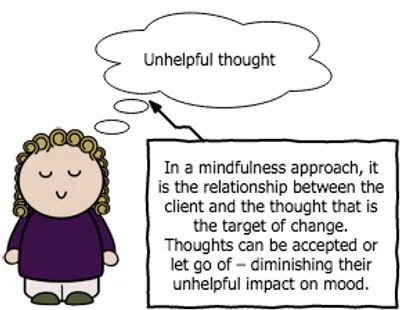Menu

The mindfulness approach to thoughts (or cognitions) is vastly different to a cognitive behaviour therapy (CBT) approach, although both can be integrated to enhance mental health treatment. In a mindfulness approach, you are taught how to be more aware of where you are placing your attention and to focus your attention on the present moment. There are many benefits to this including:
Learning to let go of unhelpful thoughts
Increasing emotion regulation skills
Living more in the present which can improve quality of life
Improving performance at tasks and daily functioning
Increase capacity to control where you place attention
Increasing acceptance skills
Improving anxiety management and relaxation skills
Improving attention and concentration
Reducing worry thoughts
Unlike the process of cognitive restructuring seen within the CBT framework, mindfulness approaches tend not to focus on changing thoughts – instead teaching skills for accepting and letting go of thoughts. In this way, the unhelpful impact of rigid or negative thoughts on mood and behaviour is reduced because our belief and investment in these thoughts is diminished. As such, in a mindfulness approach, it is your relationship to the thoughts that is the focus of change rather than the thoughts themselves (as depicted in the image below)


There is an extensive body of psychological research showing that mindfulness can be effective treatment for a range of mood disorders including depression, anxiety, and PTSD. Mindfulness shows great promise in clinical psychology, particularly for addressing issues like depression and anxiety. There is also significant evidence showing that mindfulness is effective in general population, with studies showing that mindfulness are linked to improved ratings on quality of life, well-being, as well as our processes of attention and awareness.
Mindfulness-based cognitive therapy (MBCT) is a type of psychotherapy that combines cognitive behaviour therapy (CBT) techniques with mindfulness practices. Developed by Mark Williams, Zindel Segal, and John Teasdale, MBCT is designed to help individuals manage recurrent depression and anxiety by teaching them to become more aware of their thoughts, feelings, and bodily sensations in the present moment. MBCT is based on the idea that our thoughts, feelings, and behaviours are interconnected, and that by becoming more aware of these connections, we can develop greater control over our mental health. This approach empowers individuals to break the cycle of negative thinking and cultivate a more balanced and mindful approach to life, making it effective for various mental disorders.
Cognitive therapy and mindfulness are two powerful approaches that, when combined, offer a comprehensive strategy for managing mental health conditions such as depression and anxiety. Cognitive therapy focuses on identifying and altering negative thought patterns and behaviours, while mindfulness emphasises paying attention to the present moment in a non-judgmental manner.
The synergy between cognitive therapy and mindfulness lies in their complementary nature. Mindfulness helps individuals become more aware of their thoughts and feelings, creating a foundation for cognitive therapy to work more effectively. By recognising negative thought patterns through mindfulness, individuals can then use cognitive therapy techniques to challenge and reframe these thoughts, leading to more adaptive and constructive behaviours.
Research supports the effectiveness of integrating cognitive therapy with mindfulness practices. Studies have shown that this combined approach can significantly reduce symptoms of depression and anxiety, improve mood, and enhance overall quality of life. Additionally, it has been found to reduce stress and improve sleep quality, making it a robust method for addressing various mental health challenges. By leveraging the strengths of both cognitive therapy and mindfulness, individuals can achieve a more balanced and resilient mental state.
Mindfulness-Based Cognitive Therapy (MBCT) is a unique blend of cognitive behaviour therapy (CBT) and mindfulness techniques designed to help individuals manage mental health conditions such as depression, anxiety, and stress. By focusing on the present moment, MBCT teaches individuals to observe their thoughts, feelings, and bodily sensations without judgment or attachment. This heightened awareness fosters a deeper sense of self-awareness, enabling individuals to better understand their internal experiences.
One of the core components of MBCT is the cultivation of self-compassion and acceptance. For those who struggle with self-criticism or negative self-talk, MBCT offers tools to develop a kinder and more accepting attitude towards oneself. This shift in perspective can lead to more adaptive and constructive responses to challenging emotions and situations.
In addition to mindfulness practices, MBCT incorporates elements of cognitive behaviour therapy to help individuals identify and challenge negative thought patterns and behaviours. By combining these approaches, MBCT provides a comprehensive treatment that addresses both the cognitive and emotional aspects of mental health. This integration makes MBCT a powerful tool for improving overall well-being and managing a variety of mental health conditions.
MBCT has been shown to be effective in reducing symptoms of depression and anxiety, improving sleep quality, and enhancing overall mental well-being by integrating cognitive behaviour therapy techniques with mindfulness practices. Research indicates that MBCT is particularly effective in reducing recurrence rates for individuals with a history of major depression. By teaching individuals to become more aware of their thoughts, feelings, and bodily sensations, MBCT helps them develop greater self-awareness and self-acceptance, which can lead to increased confidence, self-esteem, and emotional regulation. Additionally, MBCT can help individuals develop healthier coping mechanisms and improve their relationships with others. The practice of mindfulness within MBCT fosters a deeper understanding of oneself and promotes a more compassionate and resilient approach to life’s challenges.
Mindfulness-based therapies, such as Mindfulness-Based Cognitive Therapy (MBCT) and Mindfulness-Based Stress Reduction (MBSR), have garnered substantial evidence supporting their effectiveness in treating mental health conditions. These therapies are particularly noted for their ability to reduce symptoms of depression and anxiety, improve mood, and enhance overall quality of life.
Research consistently shows that mindfulness-based therapies can be as effective as traditional therapies, such as cognitive-behavioural therapy (CBT), in managing mental health conditions. For instance, MBCT has been proven to reduce relapse rates in individuals with recurrent depression, while MBSR has been shown to alleviate chronic pain and improve immune function. These therapies not only address the symptoms of mental disorders but also promote long-term well-being and resilience.
Beyond their impact on mental health, mindfulness-based therapies offer a range of additional benefits. They have been found to improve sleep quality, reduce stress, and enhance immune function. By fostering a mindful approach to life, individuals can develop healthier coping mechanisms and a more compassionate relationship with themselves and others. Overall, mindfulness-based therapies represent a valuable and holistic approach to mental health care, providing individuals with the tools they need to navigate life’s challenges with greater ease and balance.
Mindfulness-Based Cognitive Therapy (MBCT) is a versatile and effective treatment approach that combines cognitive behaviour therapy techniques with mindfulness practices for a wide range of mental health conditions. Some of the conditions that can benefit from MBCT include:
Depression: MBCT has been shown to significantly reduce symptoms of depression, including recurrent depression, and help prevent relapse.
Anxiety: Individuals with generalized anxiety disorder, social anxiety disorder, and panic disorder can find relief through MBCT techniques.
Stress: MBCT equips individuals with effective strategies to manage stress and develop healthier coping mechanisms.
Post-Traumatic Stress Disorder (PTSD): MBCT can alleviate symptoms of PTSD, such as flashbacks, nightmares, and avoidance behaviours.
Eating Disorders: Those struggling with anorexia nervosa, bulimia nervosa, and binge eating disorder can benefit from the mindful approach of MBCT.
Beyond these conditions, MBCT is can also be incorporated into the treatment of obsessive-compulsive disorder (OCD), and borderline personality disorder. Additionally, MBCT can serve as a preventative measure, helping individuals build resilience and enhance their overall well-being.
It’s important to note that while MBCT is a powerful tool, it is not a replacement for traditional medical treatments. Instead, it complements other therapeutic approaches, providing a holistic strategy for mental health care. If you’re considering MBCT, consulting with a qualified mental health professional is essential to determine if it’s the right fit for your needs.
MBCT involves a range of techniques and exercises designed to help individuals develop greater mindfulness and self-awareness. Some common MBCT techniques include:
Mindfulness meditation: This involves paying attention to the breath, body, or emotions in the present moment, without judgment or distraction.
Body scan: This involves lying down or sitting comfortably and bringing awareness to different parts of the body, starting from the toes and moving up to the head.
Mindful movement: This involves engaging in physical activities such as yoga or tai chi with a mindful attitude, paying attention to the breath, body, and surroundings. Specific yoga poses can facilitate mindful stretching, enhancing the practice of mindfulness-based cognitive therapy (MBCT).
Loving-kindness meditation: This involves cultivating feelings of kindness, compassion, and understanding towards oneself and others.
These exercises are designed to help individuals practice mindfulness and develop a more present-focused and accepting approach to their thoughts and feelings, integrating cognitive behaviour therapy techniques.
Mindfulness-based therapies, such as Mindfulness-Based Cognitive Therapy (MBCT) and Mindfulness-Based Stress Reduction (MBSR), are designed to help individuals develop greater awareness and acceptance of their thoughts, feelings, and bodily sensations. In a mindfulness-based therapy session, you can expect to learn various mindfulness techniques, such as meditation and deep breathing, to help you manage stress, anxiety, and depression.
A key component of these therapies is cultivating a non-judgmental attitude towards yourself and your experiences. This means learning to observe your thoughts and feelings without immediately reacting to them or labelling them as good or bad. By developing this mindful approach, you can gain greater self-awareness and self-acceptance, which are crucial for improving mental health.
Your mindfulness-based therapist will work with you to develop a personalised plan tailored to your specific needs and goals. This plan may include regular mindfulness practices, cognitive therapy techniques, and strategies for integrating mindfulness into your daily life. The supportive and collaborative nature of mindfulness-based therapies ensures that you have the tools and guidance needed to enhance your overall well-being.
If you’re interested in getting started with MBCT, here are some steps you can take:
Find a qualified MBCT therapist: Look for a psychologist or therapist who has experience in MBCT and cognitive behaviour therapy and is trained in mindfulness-based approaches. If you are in Melbourne, our therapists are able to assist. Contact us to explore booking.
Learn about MBCT: Read books, articles, and online resources to learn more about MBCT and its benefits.
Practice mindfulness: Start practicing mindfulness meditation, body scan, or mindful movement to develop greater self-awareness and self-acceptance.
Join a mindfulness group: Join a mindfulness group or class to learn from others and develop a sense of community.
Attend meditation retreats: Participate in structured programs that offer intensive mindfulness training and support. Mindfulness meditation retreats vary in format, lasting from 1 to 3 days or even up to 3 months, and target different populations. These retreats are cost-effective and have shown promising effects on mental health indicators such as anxiety and stress. They are also important for teachers of mindfulness as part of their professional development and continuing education.
Remember, MBCT is a journey, and it’s essential to be patient, kind, and compassionate with yourself as you develop greater mindfulness and self-awareness. By taking these steps, you can begin to experience the transformative benefits of mindfulness-based cognitive therapy and improve your overall mental health and well-being.
Here are some frequently asked questions about MBCT:
What is MBCT? MBCT is a type of therapy that combines cognitive behavior therapy with meditative practices and mindfulness-based attitudes.
What is the goal of MBCT? The goal of MBCT is to help individuals develop a new relationship with their thoughts, feelings, and bodily sensations, reducing symptoms of depression and anxiety.
Is MBCT effective? Yes, MBCT has been shown to be effective in reducing symptoms of depression and anxiety and in preventing relapse.
Can I learn MBCT on my own? While it’s possible to learn some MBCT techniques independently, working with a qualified therapist provides additional support and guidance, enhancing the effectiveness of the practice.


If you’re looking for a mindfulness-based therapist in Melbourne, you’ve come to the right place. Our team of experienced mental health professionals at Cova Psychology offers mindfulness-based cognitive therapy (MBCT) and cognitive behaviour therapy (CBT) to help individuals manage stress, anxiety, and depression. Our psychologists are trained in MBCT and have extensive experience working with clients from diverse backgrounds. We provide a safe and supportive environment for our clients to explore their thoughts, feelings, and behaviours, and develop greater self-awareness and self-acceptance. Whether you are dealing with recurrent depression or simply seeking to improve your mental well-being, our mindfulness-based therapists are here to support you to reach your goals.
Contact our friendly reception team at our Melbourne CBD rooms who can help link you in with one of our experienced clinical psychologists.
Let’s discuss your needs and match you with the right Melbourne psychologist.



Don't let your struggles hold you back. Call us.
Let’s discuss your needs and match you with the right Melbourne psychologist.
Let’s discuss your needs and match you with the right Melbourne psychologist



Acknowledgement of Country
Cova Psychology acknowledges the Traditional Owners of the land where our Melbourne CBD practice is located—the Wurundjeri Woi-wurrung and Bunurong/Boon Wurrung peoples of the Kulin Nation. We pay respect to their Elders, past and present, as well as the Elders of other Aboriginal communities in Melbourne and beyond.






We would like to acknowledge the Traditional Owners of the land on which the practice is located. We pay our respects to their Elders, past and present, and the Aboriginal Elders of other communities who may be here today.























